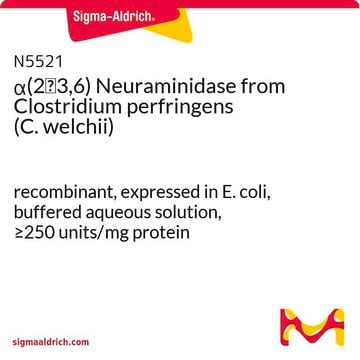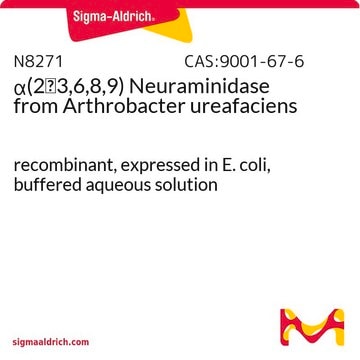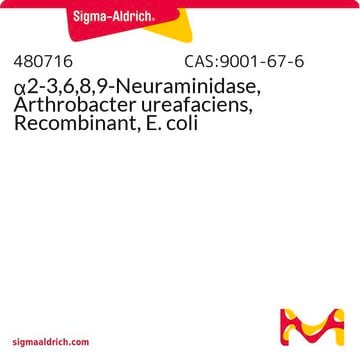N2133
Neuraminidase from Clostridium perfringens (C. welchii)
Type X, lyophilized powder, ≥50 units/mg protein (using 4MU-NANA)
Synonyme(s) :
Acyl-neuraminyl Hydrolase, Receptor-destroying enzyme, Sialidase
About This Item
Produits recommandés
Type
Type X
Niveau de qualité
Forme
lyophilized powder
Activité spécifique
≥50 units/mg protein (using 4MU-NANA)
Température de stockage
−20°C
Informations sur le gène
Clostridium perfringens str. 13 ... nanI(988807)
Vous recherchez des produits similaires ? Visite Guide de comparaison des produits
Description générale
Application
Actions biochimiques/physiologiques
Définition de l'unité
Notes préparatoires
Remarque sur l'analyse
Mention d'avertissement
Danger
Mentions de danger
Conseils de prudence
Classification des risques
Resp. Sens. 1
Code de la classe de stockage
11 - Combustible Solids
Classe de danger pour l'eau (WGK)
WGK 1
Point d'éclair (°F)
Not applicable
Point d'éclair (°C)
Not applicable
Équipement de protection individuelle
Eyeshields, Gloves, type N95 (US)
Certificats d'analyse (COA)
Recherchez un Certificats d'analyse (COA) en saisissant le numéro de lot du produit. Les numéros de lot figurent sur l'étiquette du produit après les mots "Lot" ou "Batch".
Déjà en possession de ce produit ?
Retrouvez la documentation relative aux produits que vous avez récemment achetés dans la Bibliothèque de documents.
Les clients ont également consulté
Articles
Understand sialic acid structure, function, signaling, and modifications. Easily find products for sialic acid research.
Understand sialic acid structure, function, signaling, and modifications. Easily find products for sialic acid research.
Understand sialic acid structure, function, signaling, and modifications. Easily find products for sialic acid research.
Understand sialic acid structure, function, signaling, and modifications. Easily find products for sialic acid research.
Protocoles
Enzymatic Assay of Neuraminidase applies to products that have a specification for neuraminidase content by enzymatic determination.
Notre équipe de scientifiques dispose d'une expérience dans tous les secteurs de la recherche, notamment en sciences de la vie, science des matériaux, synthèse chimique, chromatographie, analyse et dans de nombreux autres domaines..
Contacter notre Service technique











